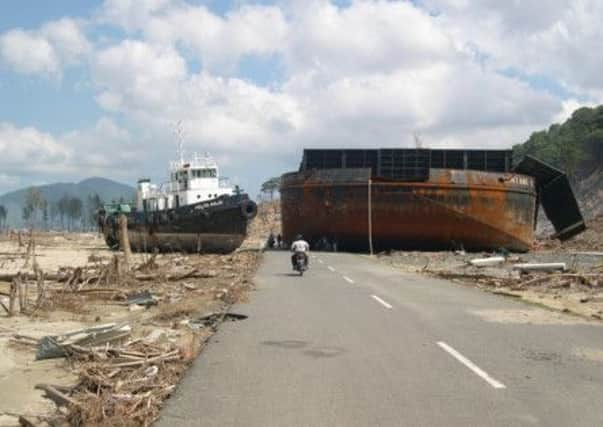Helping to rebuild lives a decade after the tsunami


ON Boxing Day 2004, Kim Tan watched in horror from his home in Leeds as news broke on television of the death and destruction caused by the Indian Ocean tsunami.
For Kim, who had grown up in Malaysia, the images he saw had a profound impact on him. “Some of my family were from areas affected by the tsunami and the images coming through looked so familiar it was tough to watch,” he says.
Advertisement
Hide AdAdvertisement
Hide AdIt claimed hundreds of thousands of lives while millions more were left homeless. In the months that followed the international response to fundraising appeals was unprecedented. When the Disasters Emergency Committee - a group of leading UK aid charities- launched its Tsunami Earthquake Appeal, few could have predicted it would go on to raise a staggering £392 million.
As a campaigner with Oxfam in Leeds Kim offered to help, and because he knew the area and spoke the language he was asked to go to Indonesia. Of the estimated $9.9 billion of damage caused by the tsunami, almost half was sustained in Indonesia, where 167,540 people had been killed. Kim helped coordinate the media from one of the worst affected areas of the country, Aceh, where the infrastructure had been left in ruins.
He arrived in the province in February 2005, by which point the delivery of emergency aid was turning into long term recovery programmes. Schools and healthcare facilities had been destroyed, the UN estimated that 655,000 people had lost their homes and the ability to earn a living had vanished.
Kim was humbled by the hospitality of the people he met, despite the struggle they faced in rebuilding their lives. “I was welcomed in by families who had lost relatives, their homes, their livelihood’s and were living in makeshift shelters, handing me coffee and apologising that they could not offer me more.”
Advertisement
Hide AdAdvertisement
Hide AdThe ability people have to adapt in tough situations was something that impressed him. “We came across a huge boat that had been pulled inland by the wave and was stranded in the middle of a road so that cars had to drive around it. In the shade of the boat, on the side of the road, a man had set up a coffee cart to pick up passing trade.”
Having been in the UK to see the huge public response to the disaster, Kim was able to witness the impact it was having in Aceh.
Many of the people Kim met were involved in ‘Cash for Work’ programmes run by Oxfam which employed locals to carry out recovery work. “The chance to be able to earn a living and rebuild your own life can mean everything. To suddenly lose so much and to have to rely on handouts can be incredibly difficult. People needed work in order to provide for themselves and their families.”
Through the combined efforts of local communities, governments and the international community, most of the areas worst hit have been rebuilt to withstand the risks of future natural disasters.
Advertisement
Hide AdAdvertisement
Hide AdSchools have begun to conduct regular earthquake drills. Public health improvements have also made families and communities more resilient and less vulnerable.
For Kim, who still lives in Leeds, his experiences in Aceh have stayed with him. He still remembers one man he met who wished to share his gratitude for all the help he and his community had received.
“He told me I must thank our government for helping them rebuild their lives and retain a sense of dignity,” he says.
“When I informed him that much of the money had come from public donations he began to well up and walked away to compose himself. The public response was huge, but the impact it had was even bigger.”